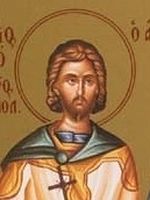Saint Theoctistus the Confessor was an influential senior Byzantine official during the first half of the 9th century. He was well known for his administrative and political competence, for his involvement in the ending of iconoclasm, and for promoting a major renaissance in education within the Empire.
In 843 AD, Theoctistus prevailed upon the Empress Theodora to officially reintroduce the veneration of icons, ending the second period of official iconoclasm. With the enthronement of a new patriarch, Methodius I, a Synod was convened in Constantinople to condemn iconoclasm -- an event that is commemorated as the "Triumph of Orthodoxy." In the same year, Theoctistus invited his nephews, Cyril and Methodius, to the imperial capital to study and to arrange the placement of Methodius as a commander of a Slavic administrative region. He also is credited with initiating a far-reaching educational program and establishing the University of Magnaura.
After a series of long-standing political intrigues involving the imperial family, he was arrested and put to death by his adversaries in 855 AD.

